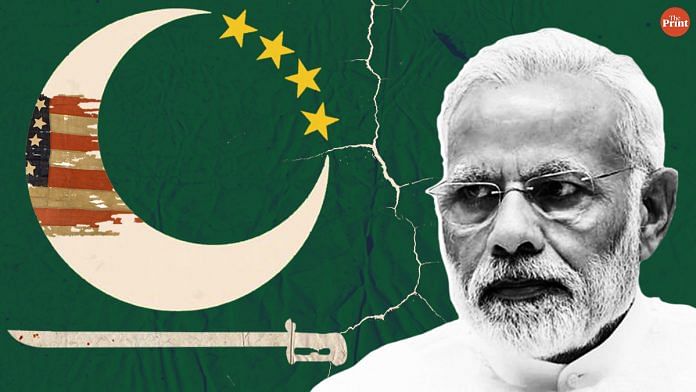Pakistan signed deals worth $20 billion with Saudi Arabia Monday on Crown Prince Mohammad bin Salman’s visit to the country, even as India vows to isolate the neighbour diplomatically after the Pulwama attack on a CRPF convoy. Already protected by China, the US will also lean on Islamabad much more after the troop withdrawal.
ThePrint asks: As Pakistan’s leverage with the US, China and Saudi Arabia grows, is it even possible to isolate it?
US wants Pakistan for Taliban, Saudis for Iran and China for waters
 Taha Siddiqui
Taha Siddiqui
Award-winning Pakistani journalist living in exile in France
Pakistan has a geo-political significance when it comes to the geographical space it enjoys in South Asia. And it has been able to utilise this significance in the best possible manner since 1947. We saw how Pakistan allied itself with the US during the Cold War era, against the USSR. Then, in the late 70s — post Iran’s revolution and the anti-Soviet jihad — it allied itself with the Saudis, who pumped money at the behest of the Americans and to counter Iranian influence in the region. Throughout this period, Pakistan has also allied itself with China, and has used Chinese-Indian rivalry for its own strategic benefit.
Today, the Americans want Pakistan to negotiate a peace deal with the Taliban, after spending 18 years and billions of dollars in Afghanistan. The Saudis want to continue to use Pakistan against Iran. And China wants to have strategic access to Pakistani waters, through Gwadar, in Balochistan, where it may build a naval base.
Given this context, it is almost impossible to isolate Pakistan, because the global powers turn a blind eye to Pakistan’s proxy wars in the region, as sometimes such militancy serves their own interest (Saudi Arabia vs Iran), or poses no direct threat to them (Kashmiri jihadi groups).
But the world should know better. Pakistan with its nuclear capabilities behaves like a rogue state, which is quite dangerous, for the country itself and for regional peace. Its international partners should urge Pakistan to give up its policy to arm extremist groups who wreak havoc in neighbouring countries and regions, because such proxies do not always remain in control of their masters.
Barring China, other countries know Pakistan is neither an ally nor a reliable partner
 Nitin Pai
Nitin Pai
Co-Founder & Director, Takshashila
Only China has strategic reasons to cover Pakistan. While the Saudis still rely on Pakistan to supply their nuclear arsenal, they have seen the limits of Pakistan’s utility as a military ally. As far as the announcement of Saudi Arabia signing deals worth $20 billion with Pakistan is concerned, these are just announcements at this point. Actual investments are a different matter.
Moreover, Saudi Arabia is also aware that India is a far more important partner going forward. As for the United States, there is consensus across parties and government departments that Pakistan is neither an ally nor a reliable partner.
Other than China, countries of the world will have transactional relationships with Pakistan. That doesn’t mean they will buy its line. The 1990s are history.
So, Pakistan is already isolated to the extent that is possible.
More than isolating Pakistan, what matters is how much relative leverage India has with Pakistan’s key sponsors. This can only come if the Indian economy grows at a fast clip and their prosperity is closely linked to ours. The answer therefore lies within — of reforming our economy and developing economic power.
Ending Pakistan’s state-sponsored terror requires international engagement, not isolation
 Talmiz Ahmed
Talmiz Ahmed
Former Indian ambassador to Saudi Arabia
In the global scenario today, it is not possible to “diplomatically isolate” any country in the world. All countries have substantial ties with other countries in their neighbourhood and globally as well. These ties remain resilient regardless of events that might take place from time to time. For instance, the US has been trying to isolate Iran for some time now, but they haven’t been successful at all. Very rarely has any country succeeded in “isolating” another nation.
The horrendous attack on Indian Parliament in 2001, the 26/11 Mumbai attacks, the recent Pathankot and Uri attacks, and now the attack in Pulwama — all caused great anger and anxiety in India. But the fact remains that such diplomatic isolation is neither possible nor can it ever be realised effectively.
In fact, our aim should be to put pressure on Pakistan. State-sponsorship of the extremist elements is the problem here, and it requires international engagement, not international isolation, to help solve it. Influential powers such as Saudi Arabia, China and the US should be encouraged to flag these concerns as they are not related to India alone.
Instead of calling for diplomatic isolation, I would insist on very robust global engagement to ensure that the state affiliation of Pakistan with extremism is removed once and for all.
India naive to imagine it could isolate Pakistan, we have ties with countries across continents
 Salman Bashir
Salman Bashir
Former foreign secretary of Pakistan, and former high commissioner of Pakistan to India
The proclivity of South Asian states to seek external support in their own squabbles betrays a deep sense of inadequacy. In today’s globalised and interdependent world, notions of alliances and counter-alliances is somewhat outdated. External players tend to benefit and promote their own interests at our expense simply because of our own immaturity and inability to reason what is good for us collectively. It is time to get out of zero-sum mentality.
Of course, it is naive for India to imagine that it could isolate Pakistan. Or for that matter for Pakistan to try to isolate India. Yet the Indian government has made isolating Pakistan a main facet of its regional and global policy. This may serve domestic political purposes but is a false policy assumption.
We have deep and historic ties with China, the US and Saudi Arabia, and are forging close relations with Russia. We have ongoing cooperation with all regional states and on all continents. Pakistan is in an active cooperative mode. We are trying hard to bring normalcy and peace to Afghanistan. We also are desirous of normalcy and cooperation with India.
Indian leadership should adopt a realistic attitude towards Pakistan. Geography is unalterable. Pakistan and India have to coexist. We desire to coexist in peace and amity. Let us shun jingoism and impulses of effacing each other and join hands to resolve our issues peacefully with a shared future in mind.
With Belt and Road Initiative, Chinese have invested way too much in Pakistan to desert it
 Srijan Shukla
Srijan Shukla
Reporter, ThePrint
Before Pakistan is isolated, it is important to know what this isolation entails and what does India want to achieve by it.
Isolation would comprise a strategy whereby India compels big powers to apply economic sanctions against Pakistan. And these sanctions would stay until Pakistan stops using state-sponsored terrorism against India.
Realistically, I don’t see this happening over the short or medium-term. Let’s look at a few hard facts.
First, over the past few decades, Chinese leaders have constantly referred to Pakistan as their only real ally. With the Belt and Road Initiative now, the Chinese have invested way too much in Pakistan to desert it. Moreover, China has a strategic goal of bypassing the Strait of Malacca and getting its oil supplies via Pakistan’s Gwadar Port.
Second, Pakistan’s nuclear programme was predominantly funded by Saudi Arabia. The relationship shared by the two countries allows Saudi Arabia to project itself as a de facto nuclear power in the Middle East.
Third, the US has a mixed relationship with Pakistan under President Trump. On one side, the US has denied aid to Pakistan, but on the other, it requires Pakistan’s support given Trump’s order to withdraw half of US troops from Afghanistan.
Beyond these, one needs to remember Pakistan’s core negotiation strategy, which involves holding a gun to its own head. And this strategy has allowed Pakistan to develop as a sort of key strategic buffer state.
These factors make it impossible for India to isolate Pakistan for now.
By Fatima Khan, journalist at ThePrint.




This talk of isolating is short-sighted distracts indians from the truth. Frankly their country is risk averse and has a fundamental lack of understanding on what Pakistan is/wants. Magical thinking about peace on India’s terms with Pakistan cuts across the entire political spectrum and will get them no where different then where they’ve already been. Now that Afghanistan is winding down…welcome to interesting times India…you had 15 years to prepare, and you can’t say you didn’t know this was coming.
I feel that isolating Pakistan will further increase India’s problems – Pakistan will turn more towards China, China will economically exploit them, the worst effected people will be a normal Pakistani, the deep state will use this to further rake up Anti-India sentiments.
What India has to do is to constrict funds and expose the enemies within. Just in the way a healthy body can drive away diseases, a strong India can drive away threats.
Prince MbS who has signed deals worth $ 20 billion recently, has said he will be Pakistan’s Ambassador to KSA.
Another important reason why Narendra Modi’s wish for the world to isolate Pakistan will not happen is that in the west his government is seen as fundamentalist, repressive and utterly undemocratic (even if they do not say so openly).
Besides, all these years, India was busy telling the world, including the UN, that the Kashmir problem was nobody else’s business, now they want it to be everybody’s business !
You keep your ranting to yourself, which lacks any insights. If India wasn’t able to isolate Pakistan then why Pakistan is on FATF grey list? Just wait and see how is plays out.